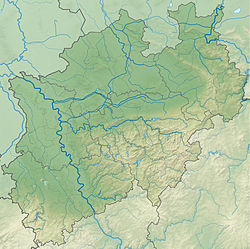| Selm-Bork Synagogue | |
|---|---|
 The Selm-Bork synagogue, now used by a
Liberal congregation | |
| Religion | |
| Affiliation | Reform Judaism |
| Rite | Nusach Ashkenaz ( c. 1818–1938) |
| Ecclesiastical or organisational status |
|
| Status | Active |
| Location | |
| Location | Hauptstraße 10, Westphalia, Unna, North Rhine-Westphalia |
| Country | Germany |
Location of the synagogue in
North Rhine-Westphalia | |
| Geographic coordinates | 51°39′55″N 7°28′02″E / 51.6653°N 7.4672°E |
| Architecture | |
| Completed | c. 1818 |
| Materials | Timber (partial) |
| [1] | |
The Selm-Bork Synagogue is a Liberal Jewish congregation and synagogue, located at Hauptstraße 10, in Westphalia, in the Unna district, in the state of North Rhine-Westphalia, Germany. The synagogue is one of two remaining rural synagogues in the region and a witness of pre- Holocaust Jewish life in Westphalia.
Historically, the congregation worshiped in the Ashkenazi rite. Since 2000, the congregation has embraced Liberal Judaism. [1]
History
The exact year of construction is unknown, the first written reference was found in a directory of houses, written in 1818. [2] Until Kristallnacht of 1938, the synagogue was used for prayer. During the pogrom the building was looted and partially destroyed. The Jewish community was forced to sell the building. A coal dealer acquired the building and used it as a barn.
In 1991 the synagogue was restored and opened for the public in 1994, the government declared the synagogue a historic monument. [3] since 1994 is has served as the place of worship for Etz Ami, a liberal Jewish community.
See also
References
- ^ a b "Synagogue in Selm-Bork". Historic Synagogues of Europe. Foundation for Jewish Heritage and the Center for Jewish Art at the Hebrew University of Jerusalem. n.d. Retrieved June 22, 2024.
- ^ Pracht-Jörns, Elfi (2002). Jüdisches Kulturerbe in Nordrhein-Westfalen. Band V: Regierungsbezirk Arnsberg (in German). Cologne: J. P. Bachem Verlag.
- ^ "LWL · Jüdisches Leben in Europa jenseits der Metropolen · die Landsynagoge in Selm-Bork: Jüdische Geschichte im Spiegel einer Synagoge" (in German). Archived from the original on July 20, 2011. Retrieved July 3, 2009.
External links
![]() Media related to
Synagoge (Bork) at Wikimedia Commons
Media related to
Synagoge (Bork) at Wikimedia Commons
- 1810s establishments in Germany
- 19th-century synagogues in Germany
- Buildings and structures in Unna (district)
- Reform synagogues in Germany
- Synagogues completed in the 1810s
- Synagogues in North Rhine-Westphalia
- European synagogue stubs
- German religious building and structure stubs
- North Rhine-Westphalia building and structure stubs
| Selm-Bork Synagogue | |
|---|---|
 The Selm-Bork synagogue, now used by a
Liberal congregation | |
| Religion | |
| Affiliation | Reform Judaism |
| Rite | Nusach Ashkenaz ( c. 1818–1938) |
| Ecclesiastical or organisational status |
|
| Status | Active |
| Location | |
| Location | Hauptstraße 10, Westphalia, Unna, North Rhine-Westphalia |
| Country | Germany |
Location of the synagogue in
North Rhine-Westphalia | |
| Geographic coordinates | 51°39′55″N 7°28′02″E / 51.6653°N 7.4672°E |
| Architecture | |
| Completed | c. 1818 |
| Materials | Timber (partial) |
| [1] | |
The Selm-Bork Synagogue is a Liberal Jewish congregation and synagogue, located at Hauptstraße 10, in Westphalia, in the Unna district, in the state of North Rhine-Westphalia, Germany. The synagogue is one of two remaining rural synagogues in the region and a witness of pre- Holocaust Jewish life in Westphalia.
Historically, the congregation worshiped in the Ashkenazi rite. Since 2000, the congregation has embraced Liberal Judaism. [1]
History
The exact year of construction is unknown, the first written reference was found in a directory of houses, written in 1818. [2] Until Kristallnacht of 1938, the synagogue was used for prayer. During the pogrom the building was looted and partially destroyed. The Jewish community was forced to sell the building. A coal dealer acquired the building and used it as a barn.
In 1991 the synagogue was restored and opened for the public in 1994, the government declared the synagogue a historic monument. [3] since 1994 is has served as the place of worship for Etz Ami, a liberal Jewish community.
See also
References
- ^ a b "Synagogue in Selm-Bork". Historic Synagogues of Europe. Foundation for Jewish Heritage and the Center for Jewish Art at the Hebrew University of Jerusalem. n.d. Retrieved June 22, 2024.
- ^ Pracht-Jörns, Elfi (2002). Jüdisches Kulturerbe in Nordrhein-Westfalen. Band V: Regierungsbezirk Arnsberg (in German). Cologne: J. P. Bachem Verlag.
- ^ "LWL · Jüdisches Leben in Europa jenseits der Metropolen · die Landsynagoge in Selm-Bork: Jüdische Geschichte im Spiegel einer Synagoge" (in German). Archived from the original on July 20, 2011. Retrieved July 3, 2009.
External links
![]() Media related to
Synagoge (Bork) at Wikimedia Commons
Media related to
Synagoge (Bork) at Wikimedia Commons
- 1810s establishments in Germany
- 19th-century synagogues in Germany
- Buildings and structures in Unna (district)
- Reform synagogues in Germany
- Synagogues completed in the 1810s
- Synagogues in North Rhine-Westphalia
- European synagogue stubs
- German religious building and structure stubs
- North Rhine-Westphalia building and structure stubs
